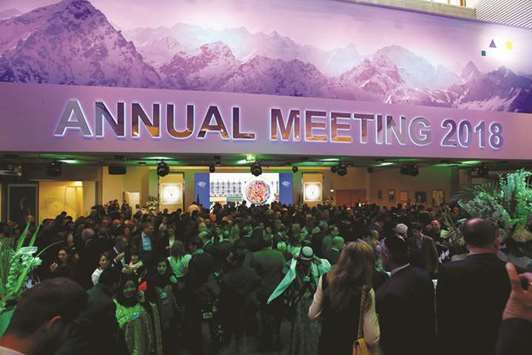The global elites have rediscovered their animal spirits.
As the World Economic Forum drew to a close in the Swiss ski resort, the overarching mood of the executives, policymakers and investors was that their economies are in fine shape and that stock markets have every reason to extend their run.
“Let’s celebrate what could go right for the moment because we are in a sweet spot,” International Monetary Fund Managing Director Christine Lagarde said on the closing panel discussion.
The Standard & Poor’s 500 Index has gained about a quarter since the start of 2017 and the IMF is forecasting the strongest worldwide economic growth this year since a brief post-recession bounce in 2011. Some 57% of executives polled by PricewaterhouseCoopers LLP saw the economy improving in 2018, about double the number of a year ago. The rise of cryptocurrencies was evident in the Swiss town both in conference sessions and on the promenade where companies rent shopfronts to promote their wares.
“The greatest worry I’ve heard over the past days in Davos is that there is not enough worry,” Mary Callahan Erdoes, JPMorgan Chase & Co asset-management unit CEO, said on the panel. “It’s OK to not be worried, to celebrate how we got here.”
Erdoes thanked the policy makers on the stage for working “tirelessly” and “giving all of these government jobs such fabulous prestige and something that I know all of us now perhaps aspire to do.”
“Wow,” said Bank of England Governor Mark Carney. “This is fantastic.”
Such sentiment led delegates to declare that it was the most upbeat Davos gathering since before the financial crisis. Yet the giddiness also gave some investors pause as they warned against turning too exuberant.
“I do feel it’s a little bit like 2006,” Barclays Plc chief executive officer Jes Staley said earlier in the week.
David Rubenstein, who co-founded the Carlyle Group, also called for caution.
“The biggest concern I have is that most people think there’s no problem of a likely recession this year or early next year,’’ said Rubenstein. “Generally, when people are happy and confident, something wrong happens.’’
But the warnings weren’t enough to damp the confidence in the corridors. Executives from JPMorgan and Deutsche Bank AG said a global boom in deal-making is set to continue this year.
“It’s the first Davos I’ve been at where we haven’t mostly been talking about a recent or a next crisis,” Bank of Canada Governor Stephen Poloz told Bloomberg Television on Friday. Even President Donald Trump, a villain for many on the pro-globalisation guest-list, was hailed in some quarters for cutting taxes and regulation. He used his much-anticipated visit to declare “America is open for business.”
“There are companies all around the world now looking at US, saying this is the place to be in the developed world,” said Blackstone Group LP chief executive officer Stephen Schwarzman.
US Commerce Department data released earlier on Friday showed fourth quarter US growth of 2.6% on an annualised basis, down from 3.2% the previous three months, though consumer spending and business investment remained strong.
Europe, often a poster boy at Davos for political or economic crisis, won praise for its recent expansion. “Europe’s been a phenomenal story,” said Harvard University professor Kenneth Rogoff.
Commodity chiefs also spoke bullishly about their outlook, having spent the past two years lamenting the price of oil. “We have not seen this kind of growth since before the global financial crisis,” said Opec secretary-general Mohammad Barkindo.
With inflation yet to accelerate, there were even predictions that the Fed and other central banks could withdraw their emergency stimulus without provoking crashes in the economy or markets.
“What we’ve seen so far are central banks that have been committed to the long cycle, they’re fully invested in QE and they’re not going to yank that liquidity out and cause disruption,’’ said Citigroup Inc CEO Michael Corbat. “One of the risks in there is that not just the Fed but other central banks get behind the curve in terms of raising rates and containing inflation and inflation gets away from us.’’
The gathering wasn’t completely free of worry. While wealthy attendees at Davos may feel pretty good about the world, many people are not seeing the benefits of the upswing, powering the populist backlash that lifted Trump into office and has fanned the rise of right-wing parties in Europe. That populism was seen as a risk, as well as protectionism, mounting debt in China and other economies, and a string of geopolitical threats. The IMF said not enough consideration is being given to the chances of a recession in the near-term and said the effect of tax cuts signed by Trump last month will prove short-lived.
Perhaps the biggest worry though was the lack of worry.
“I haven’t heard here in Davos anyone who’s pessimistic – that’s a source of concern,” said Tom Hayes, the chief executive of Tyson Food Inc, the largest US meat producer.

People waiting to listen to US President’s Donald Trump’s speech during the World Economic Forum (WEF) annual meeting in Davos, Switzerland on Friday. As the World Economic Forum drew to a close in the Swiss ski resort, the overarching mood of the executives, policymakers and investors was that their economies are in fine shape and that stock markets have every reason to extend their run.
